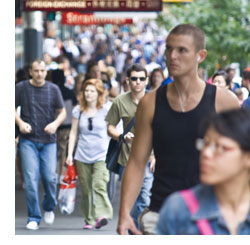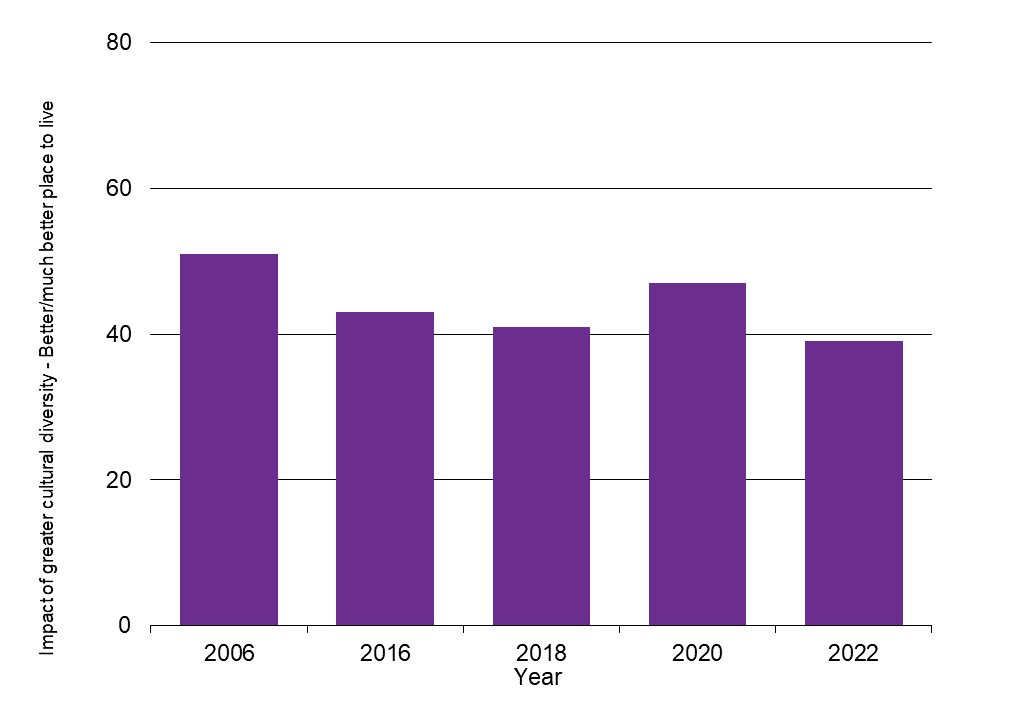Cultural respect

 CULTURAL RESPECT
CULTURAL RESPECT
| WORSENING TREND |
The percentage of Waikato survey respondents who hold a positive view on New Zealand becoming home for an increasing number of people with different lifestyles and cultures is lower in 2022 compared with 2006.
This indicator is the percentage of people who agree that New Zealand becoming home for an increasing number of people with different lifestyles and cultures from different countries make their area a better place to live. It uses data from the Quality of Life Survey.
Why is this indicator important?
The Waikato region is home to an increasing number of people with diverse lifestyles and cultures. This affects how we communicate with people from different cultural and ethnic population groups; the degree to which we make them feel part of our region; and the quality of life that everyone enjoys as a result. Higher levels of cultural respect can indicate increased community engagement and the related benefits that come from that.
Measuring our communities’ levels of cultural respect provides us with useful information which can be included with other measures to help us to plan for current and future support systems and other resources in our region.
Cultural respect

| Year | Better/much better (%) |
| 2006 | 51 |
| 2016 | 43 |
| 2018 | 41 |
| 2020 | 47 |
| 2022 | 39 |
What is this indicator telling us?
- Compared to 2006, Waikato survey respondents in 2022 were less likely to agree that New Zealand becoming home for an increasing number of people with different lifestyles and cultures from different countries makes their city/area a better place to live (39% in 2022 compared to 51% in 2006).
- Across the Waikato region in 2022:
- The percentage of people who agree that an increasing number of people with different lifestyles and cultures from different countries makes their city/area a better place to live range from 28% in Hauraki district up to 45% in Matamata-Piako district. (Note: not asked for Hamilton as question was removed in 8-cities questionnaire).
- Respondents aged 65 plus were less likely to agree that New Zealand becoming home for an increasing number of people with different lifestyles and cultures from different countries makes their city/area a better place to live (31%).
- Respondents who identified with the Asian/Indian ethnic group were more likely to agree that New Zealand becoming home for an increasing number of people with different lifestyles and cultures from different countries makes their city/area a better place to live (64%).
DATA SOURCE AND SUPPORTING INFORMATION
Cultural respect is measured as the percentage of people who agree that New Zealand becoming home for an increasing number of people with different lifestyles and cultures from different countries makes their area a better place to live. Data are from the Quality of Life Survey.
Update details: Waikato regional results are available for 2006, 2016, 2018, 2020 and 2022.
Customised data request requirements: Quality of Life data.
DATA AVAILABILITY – OTHER THAN WAIKATO REGION:
Territorial Authority (TA) disaggregation: Yes
Other regions: No
New Zealand: No (from 2022, this question format was removed from the 8-cities questionnaire)
Other countries/ Organisation for Economic Co-operation and Development (OECD): No




To ask for help or report a problem, contact us
Tell us how we can improve the information on this page. (optional)